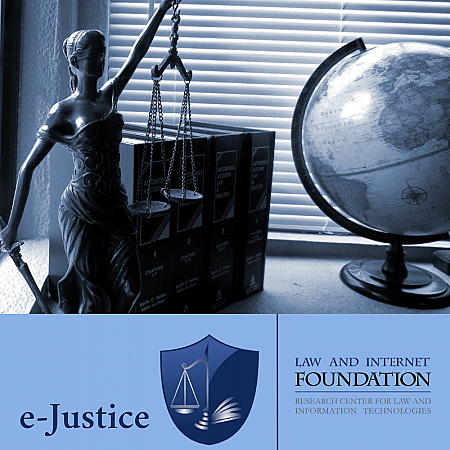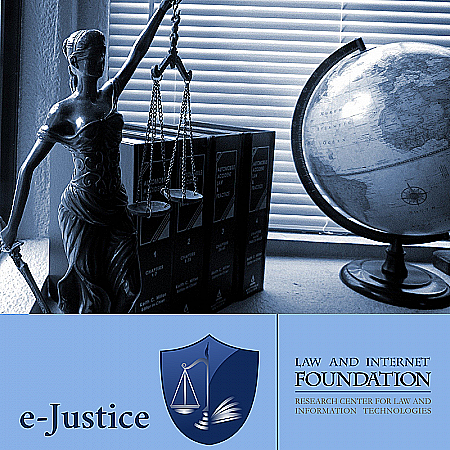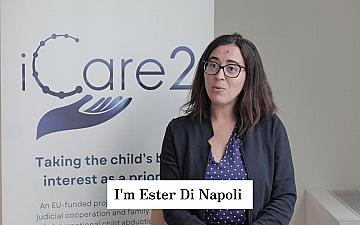
e-Justice in Criminal Matters – Germany's Model Example
Author: Hristina Bogia, expert in Law and Internet Foundation
In the digital technology era, we live in everything we need is considered at just one click away from us. Therefore, electronic communications are also turning into means to exercise state authority. The COVID-19 pandemic influenced that process. The safety and security measures have closed the doors of many institutions and government bodies. So, they had to find another way to provide their services to the citizens. The pandemic has facilitated an improved provision of public services through electronic means and things have shifted to the possibilities digitalization is offering. An electronic equivalent of many services was established, courts initiated online streaming to comply with their obligations related to public hearings; in a couple of months, the administration of criminal justice is expected to run through electronic means.
It is not a coincidence that the criminal procedure is the last to become digital. The use of electronic evidence and statements made in the scope of a committed crime are a worldwide challenge, and they raise concerns rather than confidence that technology will be useful for the criminal procedure. This article aims to highlight Germany’s model example in implementing e-Justice in the scope of criminal procedure. It is considered that the digitalization of the public sector is more advanced there, rather than in Bulgaria, despite the fact that legal system and legislation of both countries are similar.
What is going to be “electronically” possible by mid-year within the criminal procedure in Bulgaria?
The forthcoming legislative changes, which shall enter into force this year are the result of long-standing efforts and planning. According to the novel articles of the Criminal Procedure Code (CPC), court documents will be produced in the form of an electronic document directly through the information system of the judiciary and will be signed with a Qualified Electronic Signature (eSignature). On the grounds of the first action within the process an electronic case will be created within the information system of the competent court. The writ of a summons, notices and court papers shall be carried out electronically if the relevant interested party has given a consent and if an electronic address is known. The consent may be withdrawn at any time.
Are we prepared to exercise our rights by electronic means?
In the scope of judicial proceedings, the accused shall have the right to make notes, objections, and to appeal the acts that infringe his/her rights and legitimate interests, electronically and to sign them with an eSignature. If a state of emergency occurs, an introduction of a martial law; disaster, epidemic, or other force majeure circumstances arise, as well as if the accused and his defense counsel have given their written consent, the accused shall be able to participate in the trial by videoconference. In that case the accused identity will be verified by the chief of the prison or the head of the detention center, or by an officer designated by them. Same is applicable with regard to the proceedings of the court of appeal. As a result, the escorting between prison and court shall no longer be necessary. This will not only facilitate the criminal proceedings but will serve as a guarantee to comply with general procedural principles – effective participation of the accused in the proceedings, publicity of the trial, fairness. On the other hand, the question of whether prisons and courts have the technical capacity to hold videoconferences remains unanswered. It is quite common that the law provides the opportunity for a certain process to become legally digital, but it turns out that this is not possible to be implemented in practice.
Can we learn from Germany?
In Germany, the digitalization of court cases shall be completed by the end of 2026.[i] During the current transitional period, full electronic case management will only be possible in some courts and prosecutors' offices. From a procedural perspective, digitalization covers the complete proceedings - investigation and the storage by the court of already collected materials. General rules for communication among participants in the criminal proceedings, in both Bulgaria and Germany provides for the application of the general rules for electronic identification (considering the specific rules for lawyers).
It is interesting that the materials of court cases in Germany shall be stored in PDF format (which could be printed, copied, but is also machine-readable) and those requirements shall be legally established in a regulation. The rules on the format of court materials are not a minor aspect, but a detail that can subsequently lead to serious practical challenges. The introduction of standardization or introducing a set of technical specifications is a good approach that will save time in the future. The status quo in Germany provides for an exception to the general rules regarding the PDF format of court materials if, for some reason, it is not possible to store the file. In such situations it shall be permissible for the electronic form to correspond to the current advancements of technology.[ii] This legislative technique is not new to the Bulgarian legislator. It enables the court staff to solve routine technical problems in order to be able to fulfill their general obligations.
Is the access to the case affected by the amendments?
In Germany, persons accused of committing a crime, who do not have an appointed defender, have the right to read excerpts from the court materials, which only meet the need of the defense and do not violate the secrecy of the investigation or the rights of third parties. That rule is related to the risk management of manipulation of the case file.[iii] However, with the digitalization of the system, this danger is eliminated, and the accused are given full access to the materials. This guarantees the right to a fair trial, but some practitioners in Germany are questioning whether granting access to the whole electronic case to the accused is not going to infringe the rights of third parties involved. In terms of that data anonymization is going to be necessary; it will be time-consuming to read the complete electronic case file considering the rules for data protection. Nevertheless, the right to a fair trial has priority over the efforts to protect individuals' personal data (which is in fact an obligation of the court anyway). The protection of personal data cannot be the only reason for the restricted access to the case, a proportionality and necessity assessment should be undertaken with regard to that. The right of private prosecutors and plaintiffs to gain access to the court files is also expanding, as they no longer shall need a lawyer.[iv] Accordingly, practitioners raise the question of whether unlimited access to the materials will not affect their free judgment when testifying. These considerations also apply to the application of the new rules in Bulgaria. Thus, the amendments to the CPC grant the right to gain remote access to the electronic case materials for the victim, the private prosecutor, and the plaintiff.
An eSignature instead of a
lawyer?
The German law has also been criticized for lacking sufficiently detailed rules with respect to the access to the case during the investigation of detainees. Detainees do not have free access to computer devices. The technical means available in the detention facilities also vary and it is difficult to adopt uniform rules which could cover all possible hypotheses.[v] Additionally, the rules explicitly state that information part of the case cannot be restricted by the lawyer's access. With respect to the latter, it is important to define the term "part of an electronic case file". When it comes to paper case files, the simple fact of having the documents between the covers of the file makes them part of the case. According to some German authors, such indicator cannot be applied to electronic cases. Their argument is that the variety of file formats in electronic case management systems is an obstacle, and that some documents drawn up by the competent authorities may be made easier to read in conjunction with each other by using a specific format. When the software in use has different functionalities, it is also challenging to provide identical standard. This issue, as explained above, can be overcome by introducing a uniform document format.
What happens when an electronic
case file is send from one authority to another?
The differences among information systems of the competent authorities (e.g., the information system of the investigating authorities and the information system of the court) and the specifics related to the electronic case file, could be compared to Schrödinger's cat.[vi] This includes the following experiment - a cat and a glass bottle full of poison are placed in a box. The bottle could fall, break into pieces, and kill the cat, but it is also possible that the bottle remains intact, and the cat stays alive. What matters is that while the box is closed, there is no way for us to know if the cat is dead or alive. The only thing we see is a closed box. The parallel between Schrödinger's cat and the management of case files in electronic format encompasses the reasoning that while documentation is kept and stored in various information systems for data processing (i.e., software), there is no way for us to know whether the establishing of connection across systems will affect them negatively. Only if exchange of data and integration between various systems and registers begins, we will gain knowledge on whether the electronic case file will "live" or difficulties in reading the files will be at hand. This risk exists whenever a states’ administration process is optimized, and the changes are implemented in the absence of a centralized information system to merge the new processes.
Are we going to witness data leaks?
Last but not least, when introducing e-Justice in the scope of criminal proceedings, emphasis is also placed on the protection of personal data not only of third parties, but also in accordance with the general obligations under the LEAs Directive.[vii] Experts focus on the fact that the management of electronic case files will allow automated data processing. The main concern is that the machine-readable format will facilitate easy and fast connection to data, filtering and reading of large volumes of sensitive data. Thus, the concept of informational self-determination (i.e., Informationelle Selbstbestimmung, unknown to Bulgarian law) becomes a matter of discussion, bearing in mind that documents, gathered with relation to criminal proceedings, will be constantly exposed to the danger of unauthorized access. The importance of controlling the data by the public authority becomes of utmost importance, as in Germany it is permissible to outsource certain processing activities to private IT companies.
Digital signature in the
sentence?
In Germany it has been established that even the slightest change in the text of the sentence requires its re-signing with an eSignature. That is why the sentence of court panels is signed, firstly, on paper and then sent to a staff member for eSignature and then scanned. Thus, the creation of an original digital court document is completed.[viii] In Bulgaria, the sentence shall be created in the unified information system of the courts and announced by the chairman of the court panel immediately after it is signed with eSignature by all members of the court. However, the need to re-sign the sentence would create serious obstacles and would be time-consuming. To avoid a disruption (due to formal omissions) in creating a judicial act, it would be useful to have clearly defined steps for judges and jurors to follow when signing documents.
Now just watch!
To summarize, although both Bulgarian and German rule of law lay down plain and clear procedures, improvements aiming to digitalize processes often lead to surprising difficulties in their practical implementation. When observing the German model example[ix], we can bring up a few specific issues that deserve attention:
- How will the exchange of information between judicial and investigative bodies take place, given the differences in their information systems?
- How will the ordinary citizen - witness or accused - sign electronic documents?
- How will secure document scanning be performed and is it not possible to avoid scanning at all?
- How long will the case file be kept and who will have the obligation to destroy it?
Information and communication technology improves our everyday life, not only with respect to our private communication, but also related to public administration services. The introduction of eSignature, electronic identification and remote access to case files is an ambitious process not only for Bulgaria. So, the challenges are yet to come.
According to a study concluded in the scope of FORMOBILE Project[x] by Law and Internet Foundation and TimeLex, the collection and storage of electronic evidence is also an issue that has not been addressed in most European legal systems. With the introduction of e-Justice, along with all accompanying difficulties that need to be tackled, the need to distinguish between electronic evidence and electronic documents becomes even more important.
[i] Brosch Ch., Fiebig P., E-Akte in Strafsachen ,https://www.lto.de/recht/juristen/b/e-akte-strafsachen-akteneinsicht-digital-dokumente-pdf-bea/2/, last accessed 29.01.20201
[ii] Brosch Ch., Fiebig P., E-Akte in Strafsachen, https://www.lto.de/recht/juristen/b/e-akte-strafsachen-akteneinsicht-digital-dokumente-pdf-bea/, last accessed 29.01.2021
[iii] Ibid.
[iv] Ibid.
[v] Ibid.
[vi] Brosch Ch., Elektronische Akte und elektronischer Rechtsverkehr in Strafsachen, JurPC Web-Dok. 1/2018, Abs. 1 – 62, https://www.jurpc.de/jurpc/show?id=20180001, last accessed 25.01.2021
[vii] Directive (EU) 2016/680 of the European Parliament and of the Council of 27 April 2016 on the protection of natural persons with regard to the processing of personal data by competent authorities for the purposes of the prevention, investigation, detection or prosecution of criminal offences or the execution of criminal penalties, and on the free movement of such data, and repealing Council Framework Decision 2008/977/JHA
[viii] Brosch Ch., Elektronische Akte und elektronischer Rechtsverkehr in Strafsachen, JurPC Web-Dok. 1/2018, Abs. 1 – 62
[ix] [ix] Elektronische Akte in Strafsachen, https://www.edvgt.de/elektronische-akte-in-strafsachen/, достъпен на 25.01.2021
[x] From mobile phones to court – A complete FORensic investigation chain targeting MOBILE devices (FORMOBILE), D2.2 Criminal Procedure Report, https://formobile-project.eu/downloads/publications-public-deliverables/128-public-deliverable-2-2-formobile-criminal-procedure-report-v1-1-1/file









